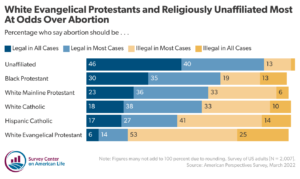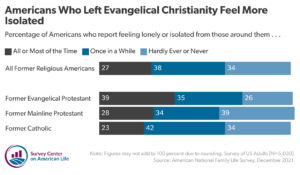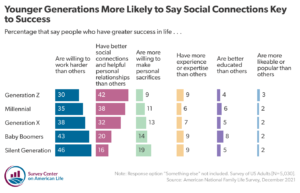All Research
Short ReadsMay 3, 2022
Religious Divide Over Abortion
The Supreme Court appears poised to overturn Roe v. Wade, the 50-year-old ruling that legalized the right to abortion in the U.S. But Americans consistently show support for legal abortion in at least some circumstances. A majority (56 percent) of the public says abortion should be legal in most or all cases. Approximately four in
Survey ReportApril 27, 2022
Politics, Sex, and Sexuality: The Growing Gender Divide in American Life
The nature of gender differences is a source of enduring debate in American society. The divide between young men and women is growing larger over sex, sexuality, and politics. Men spend more time playing video games, watching pornography, and report a greater interest in politics, while women are more likely to pick up a book or meditate.
CommentaryApril 11, 2022
Gen Z is the Loneliest Generation — and It’s Their Parents Fault
Gen Z is the most accomplished generation, but new data show they missed out on fun and family, leaving them more adrift than previous generations.
CommentaryApril 10, 2022
Stop Blaming Young People for Leaving Religion
Much of the decline in current religious commitments can be traced back to the way young adults have been raised.
CommentaryApril 5, 2022
For Gen Z, Religious Pluralism Will Require Bridging the Religious-Secular Divide
For Generation Z, American religious life has been defined by its diversity. And religious pluralism has been as much practice as principle.
Short ReadsMarch 29, 2022
Religious Disaffiliation and Loneliness
The act of leaving religion can be difficult. Americans who leave their childhood religion report more acute feelings of social isolation and disconnection. This is especially true for those who disaffiliate from more conservative faith traditions. Nearly four in 10 (39 percent) former evangelical Protestants report feeling lonely or isolated from those around them all
Survey ReportMarch 24, 2022
Generation Z and the Future of Faith in America
The religious and social experiences of young adults today are entirely different than previous generations. New family dynamics and parenting choices are reshaping the religious experiences of young people, setting them on a very different trajectory than past generations and making Generation Z the least religious generation.
CommentaryMarch 13, 2022
We Live in a Nation of Strangers. That Needs to Change
Diversity is not the source of our current problems; our troubling incuriosity about our neighbors is driving disconnection.
Short ReadsMarch 7, 2022
Generational Split on Success
Is the illusion of meritocracy broken? A new study finds generational divides in views about what matters most for success. Older generations are far more likely to say work ethic plays a critical role in achieving success in life, while younger Americans are less likely to see it that way. Close to half of Americans
Short ReadsFebruary 24, 2022
Race and Sibling Relations
Childhood experiences with your siblings have been shown to play an important formative role for young children. But not all Americans are equally close with their siblings. Black Americans in particular stand out for their strong childhood sibling relationships. A majority (53 percent) of Black Americans who grew up with siblings report they felt very










![Chart showing percentage of each group who grew up with siblings who say growing up, they had a [blank] relationship with their siblings](https://www.americansurveycenter.org/wp-content/uploads/2022/02/Bq3hH-majority-of-black-americans-report-very-close-childhood-sibling-relationships--300x160.png)